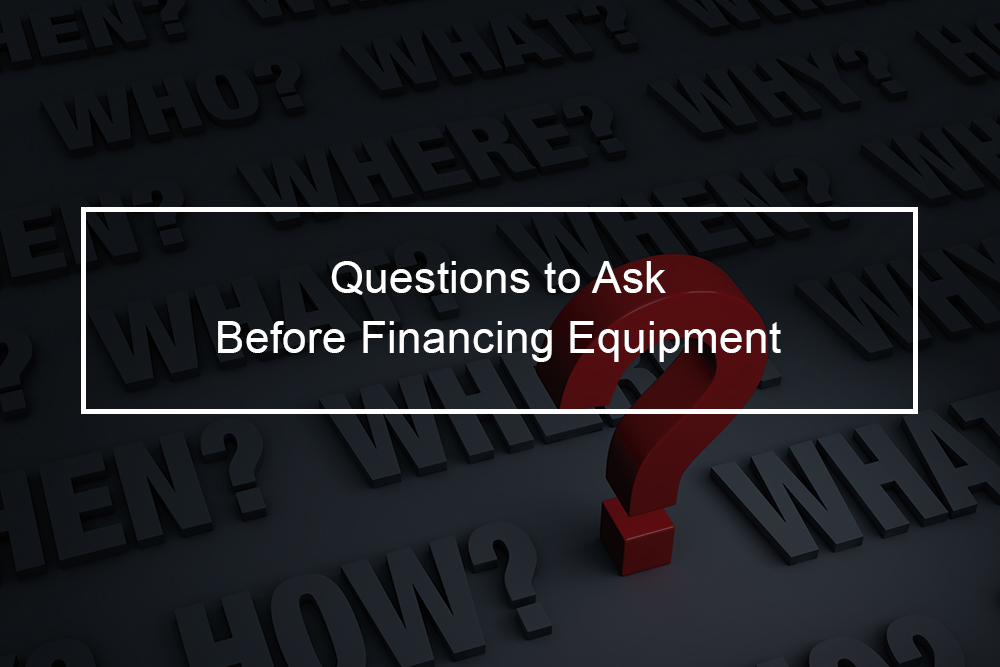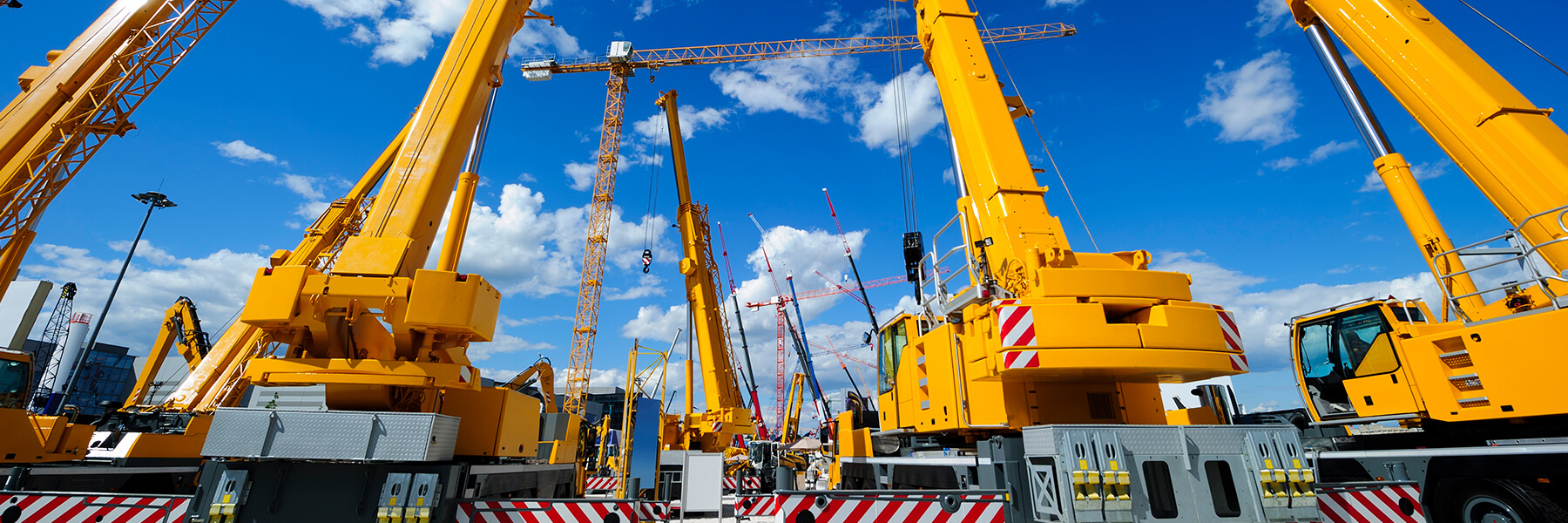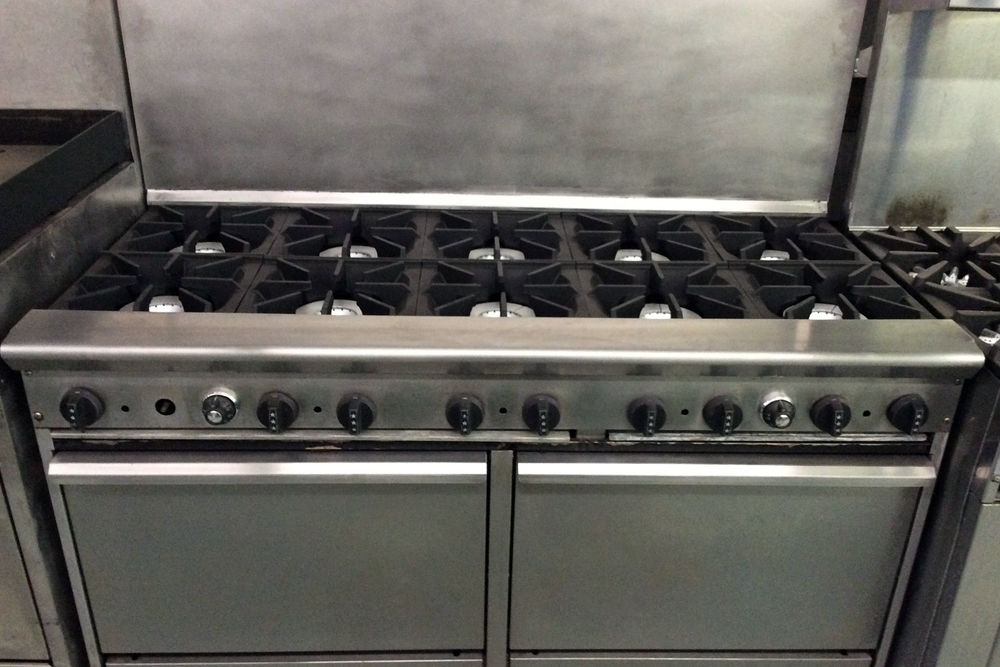13 Must ask due diligence questions before financing equipment
One of the best ways of determining if an equipment financing loan is right for your business is to ask the right questions before making the decision. If preserving capital, managing cash flow, and obtaining flexible financial solutions are priorities, you might want to take a strong look at equipment financing. Generally, the value of equipment comes from using it, not owning it, after all. Discover if equipment financing is a fit.
Ask these thirteen questions before signing the dotted line
How will you be using the equipment?
Determine how your business will use the equipment and the length of time it will be required. This will help determine the right level of investment for financing. To help decide if leasing or equipment financing is a profitable financing option, perform a simple cost/benefit analysis that compares the periodic financing payment to the revenue you expect to generate from using the equipment.
How well does the equipment financing company representative understand your business?
Generally, it is beneficial to work with someone who understands your particular industry, regardless of the service you are seeking. This is even more vital with regard to equipment financing. The equipment financing company’s understanding of market fluctuations and other factors that affect your company can greatly impact a financing contract’s
For one, financing programs can vary, and financing customization that considers individual business needs and requirements such as budget, cash flow, transaction structure, and cyclical fluctuations is key reason companies seek financing. For instance, seasonal businesses would require financing terms with the flexibility to miss one or more payments without incurring penalties during their low season.
It is also essential for the equipment finance company to understand your cash flow requirements and business tax. When it comes to taxes, lease payments are an allowable tax-deductible overhead expense from corporate income. This gets rid of depreciating owned machinery over five to seven years, following IRS schedules. Most importantly, the equipment financier can be considered a valued consultant, offering additional benefits through life cycle asset management solutions.
Can you buy the equipment from the vendor of my choice?
Some equipment financing companies insist that you buy equipment from certain vendors. This should be an immediate deal-breaker. You should have complete freedom to choose a vendor (or vendors) that satisfy your business needs — not a financing company’s vendor.
What are the total financing payments and costs?
Asking this question will get rid of any future misunderstandings about the total monthly payments due, the number of payments, and any additional costs related to taxes, insurance, and other charges. Also, ask if there are additional costs associated with the financing program that may occur during the course of the term, including late payment fees and other surcharges.
What information does the financing company need about my business?
When you are ready to seek equipment financing, you should be ready to share basic financial information about your business, just like you would with a typical bank loan for an auto or home improvement. But if you are interested in equipment financing for the first time, you will want to obtain an application before you are ready to apply, just to see what types of information are required. Be wary of any equipment finance company that can not provide you with an application, or worse yet, one that makes you send in money to apply.
Are there any records of accreditation and government licensing of the equipment financing company?
It is critical that you work with a company you know and trust to offer the best financing terms and services. Check with the Better Business Bureau to ensure no complaints or fishy-looking statements have been filed about the equipment financing company. There should be state-by-state financial regulatory agencies and financial licensing that can confirm a company’s legitimacy, too.
What is the equipment financing company’s policy on bad credit equipment financing?
If you have exceptional personal and business credit, then this question will not be part of your due diligence. Nonetheless, if you are among the hundreds of thousands of business owners who do not have perfect credit scores, it is vital that you work with a partner that looks at other criteria to determine your creditworthiness.
Can you choose between leasing or purchasing equipment?
In basic terms, a lease is the same as renting, while financing funds ownership. Both financing options have benefits based on your industry and the kind of equipment you need. Leasing your equipment offers the flexibility to continue to upgrade as new models become available, making it an appropriate choice for technology purchases and other equipment types that become out-dated in a short time. Payments are typically tax-deductible as business expenses, and you can opt to renew the lease or find better equipment at the end of the terms. Financing offers you the money to buy equipment outright without using the cash you need for running your business. You benefit from the Section 179 tax deduction for equipment purchases, but payment for the equipment is spaced out across the financing agreement’s terms instead of being made upfront.
If you choose to lease, can you buy the equipment later?
Fair market value (FMV) and dollar buyout leases are popular options from alternative lenders. If you have ever leased a car, you are familiar with how FMV leases work. In these agreements, you make fixed payments for the period of the terms and have the option to either upgrade the equipment or purchase it at fair market value. Dollar buyout leases are more costly each month; however, at the end of the terms, you can own the equipment for $1. As with equipment financing, both options give you the ability to buy the equipment you could not afford to purchase outright by breaking the price down into manageable payments.
What happens if you want to change or end the lease early?
This is mainly important if you are leasing equipment. If you wish to end a lease earlier than initially contracted, it is essential to understand the agreement’s terms. Generally, a lease is a contract between two or more parties developing obligations for those parties; thus, changes such as to the length of time or terms requested after signing and not outlined in the initial agreement could lead to additional charges or payments.
A master lease, on the other hand, which controls later leases or subleases, is created to facilitate changes in leasing needs and is an option that many companies choose. This kind of leasing contract permits the leasing of certain assets. Also, it allows the acquisition of additional assets under the same basic terms and conditions without negotiating a new contract, therefore providing maximum flexibility.
What are the qualifications for an equipment financing?
It is usually easier to qualify for a heavy equipment loan than a traditional loan since the machinery itself serves as collateral. Generally speaking, if you have been in business for more than a year, and you have at least a decent credit rating, you should probably qualify for a heavy equipment loan.
How can I save money by working with you?
This is a question that should ask a financing company. Being a consistent client or investing in more than one piece of equipment at a single time can offer benefits in many different business contexts. You do not want to leave potential savings and other benefits on the table, so be sure to ask about discounts, offers, or other special rates provided by potential business partners. A deal should not be the only reason you choose to work with one equipment financing company over another, but when you can be sure about core factors like the reliability of equipment, it is a valuable consideration.
What is your turnaround time?
Last but not least, make sure that you work with an equipment financing company that understands time is of the essence. They should commit to evaluating your application within a day, and upon approval, they should have the funds in your account within a week.
The truth about equipment financing loans
Generally, the equipment purchased with the funds serves as collateral for the loan, which indicates that borrowers do not have to pledge additional assets. Besides, unlike equipment leasing, borrowers own the equipment outright versus renting it from a leasing company. This is an important and yet often overlooked advantage since while the monthly payments for equipment leasing are (obviously) lower than equipment financing, the total cost of borrowing is significantly higher in the long-run. With this in mind, it is also significant to highlight that not all equipment financing companies have the same policies.
In conclusion, remember that the more questions you ask, the more information you will have to make an informed decision about equipment financing. Knowing the right questions to ask will put you in the strongest position possible as you acquire equipment so that you can focus on making strategic use of the equipment at a time when businesses need every advantage possible to stay afloat and be competitive.












